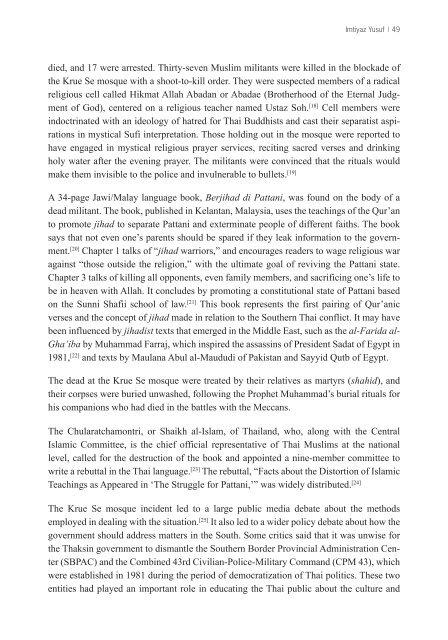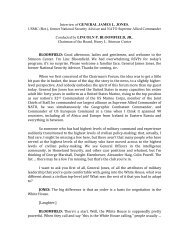Islam and Politics - The Stimson Center
Islam and Politics - The Stimson Center
Islam and Politics - The Stimson Center
You also want an ePaper? Increase the reach of your titles
YUMPU automatically turns print PDFs into web optimized ePapers that Google loves.
Imtiyaz Yusuf | 49<br />
died, <strong>and</strong> 17 were arrested. Thirty-seven Muslim militants were killed in the blockade of<br />
the Krue Se mosque with a shoot-to-kill order. <strong>The</strong>y were suspected members of a radical<br />
religious cell called Hikmat Allah Abadan or Abadae (Brotherhood of the Eternal Judgment<br />
of God), centered on a religious teacher named Ustaz Soh. [18] Cell members were<br />
indoctrinated with an ideology of hatred for Thai Buddhists <strong>and</strong> cast their separatist aspirations<br />
in mystical Sufi interpretation. Those holding out in the mosque were reported to<br />
have engaged in mystical religious prayer services, reciting sacred verses <strong>and</strong> drinking<br />
holy water after the evening prayer. <strong>The</strong> militants were convinced that the rituals would<br />
make them invisible to the police <strong>and</strong> invulnerable to bullets. [19]<br />
A 34-page Jawi/Malay language book, Berjihad di Pattani, was found on the body of a<br />
dead militant. <strong>The</strong> book, published in Kelantan, Malaysia, uses the teachings of the Qur’an<br />
to promote jihad to separate Pattani <strong>and</strong> exterminate people of different faiths. <strong>The</strong> book<br />
says that not even one’s parents should be spared if they leak information to the government.<br />
[20] Chapter 1 talks of “jihad warriors,” <strong>and</strong> encourages readers to wage religious war<br />
against “those outside the religion,” with the ultimate goal of reviving the Pattani state.<br />
Chapter 3 talks of killing all opponents, even family members, <strong>and</strong> sacrificing one’s life to<br />
be in heaven with Allah. It concludes by promoting a constitutional state of Pattani based<br />
on the Sunni Shafii school of law. [21] This book represents the first pairing of Qur’anic<br />
verses <strong>and</strong> the concept of jihad made in relation to the Southern Thai conflict. It may have<br />
been influenced by jihadist texts that emerged in the Middle East, such as the al-Farida al-<br />
Gha’iba by Muhammad Farraj, which inspired the assassins of President Sadat of Egypt in<br />
1981, [22] <strong>and</strong> texts by Maulana Abul al-Maududi of Pakistan <strong>and</strong> Sayyid Qutb of Egypt.<br />
<strong>The</strong> dead at the Krue Se mosque were treated by their relatives as martyrs (shahid), <strong>and</strong><br />
their corpses were buried unwashed, following the Prophet Muhammad’s burial rituals for<br />
his companions who had died in the battles with the Meccans.<br />
<strong>The</strong> Chularatchamontri, or Shaikh al-<strong>Islam</strong>, of Thail<strong>and</strong>, who, along with the Central<br />
<strong>Islam</strong>ic Committee, is the chief official representative of Thai Muslims at the national<br />
level, called for the destruction of the book <strong>and</strong> appointed a nine-member committee to<br />
write a rebuttal in the Thai language. [23] <strong>The</strong> rebuttal, “Facts about the Distortion of <strong>Islam</strong>ic<br />
Teachings as Appeared in ‘<strong>The</strong> Struggle for Pattani,’” was widely distributed. [24]<br />
<strong>The</strong> Krue Se mosque incident led to a large public media debate about the methods<br />
employed in dealing with the situation. [25] It also led to a wider policy debate about how the<br />
government should address matters in the South. Some critics said that it was unwise for<br />
the Thaksin government to dismantle the Southern Border Provincial Administration <strong>Center</strong><br />
(SBPAC) <strong>and</strong> the Combined 43rd Civilian-Police-Military Comm<strong>and</strong> (CPM 43), which<br />
were established in 1981 during the period of democratization of Thai politics. <strong>The</strong>se two<br />
entities had played an important role in educating the Thai public about the culture <strong>and</strong>

















